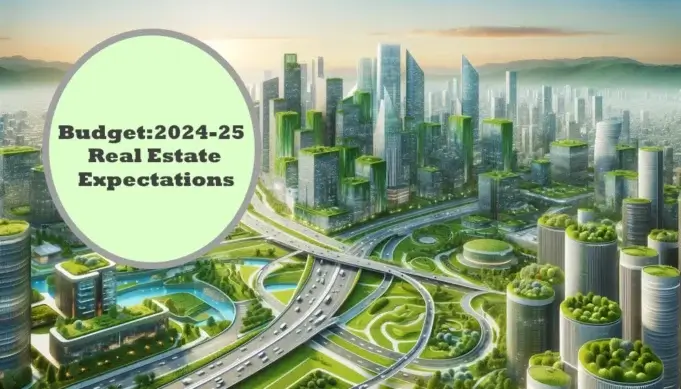On 1st of February 2024, the finance minister is going to present the interim budget for the year 2024-25. Below presented are the budget expectations expressed by various Real Estate companies.
Ashok Singh Jaunapuria, MD and CEO, SS Group
As we stand at the threshold of the dawn of a new financial year, we are eagerly awaiting the release of the Union Budget 2024-25.
With Indian real estate peaking in 2023, we are confident that this buoyant trend will continue well into 2024 as well in the backdrop of a healthy macroeconomic outlook, an uptick in the job market and stable lending rates. This year could be the year of reckoning if the government can focus on the affordable housing segment. Through carefully curated policy impetus, fiscal support, the government should look at giving a boost to this segment which will bridge the widening housing gap.
Another important element we are seeking from the Union budget 2024 is to increase the home loan interest rebate from the existing Rs.2 lakh to Rs.5 lakh. This will attract genuine home buyers and boost demand.
Finally, a single-window clearance to reduce roadblock and speed up projects together with RERA amendments will be a great boon” Mr. Ashok Singh Jaunapuria, MD & CEO, SS Group.
Ranjeeth Rathod, MD, DRA Homes
“Real estate has been in an upward trajectory post-Covid in 2021. We expect this Bull cycle to continue further in 2024. The interest rates have peaked in the US and India, and we should expect interest rate cuts in 2024 making home loans cheaper and this should provide the biggest impetus in 2024.
There is a shortfall of supply in all categories whether Affordable, Middle class, or luxury and demand is out-stripping supply. Further India story is shining with job creation across manufacturing and services sectors. India taking the lead in Global capability centers, Fin-tech, AI, deep tech, and start-ups will lead to more job creation and thereby more home buying. On the last note, the interest from NRIs is growing and at current Rs / $, Indian real estate is an attractive proposition to them for investment. Overall, we expect 2024 housing demand to be robust. A stable govt post-election will further ignite India’s position and Housing demand.”
Vihang Sarnaik, Director, Vihang Group
“A critical facet of my expectation from the Budget is the re-evaluation of affordable housing criteria. I expect the Honourable Finance Minister will find some merit in establishing a separate affordable housing index for each Tier-1 and Tier-2 cities with impetus to the housing affordability of the Metro Cities Periphery.
It is crucial to incorporate essential factors such as inflation, land cost, construction cost, approval cost, and labour cost for defining affordability in housing.
For instance, in the case of Mumbai, where housing costs are notably high, we hope that the Budget will increase the price ceiling of affordable housing from ₹45 lakhs to ₹90 lakhs so that the whole affordable scheme benefits reach its intended audience.
As per the current affordable housing scheme, the limit is set at ₹45 lakhs and you will not find a single home in Mumbai in that price bracket. So, the scope of availing the full benefit of credit link subsidy under PMAY is non-existent in Mumbai.
According to me, the Government should redefine affordable housing and extend the Credit Linked Subsidy Scheme (CLSS) and Pradhan Mantri Awas Yojana (PMAY) to a larger audience as per the existing real estate prices prevalent in the city and not make it centralised. I think such a move will empower the unorganised sections and salaried professionals to fulfil their dream of owning a home in a city like Mumbai.”
Sachin Marani, Director – Square Feet Group, Secretary – CREDAI MCHI – Thane
“As we stand on the cusp of a new budget coupled with a promising urban housing scheme, the potential for transformation looms large, particularly for families inhabiting rented homes, slums, chawls, and unauthorized colonies within cities. These financial initiatives carry the promise of a substantial impact, especially in bustling metropolises like Mumbai, where nearly 30% of the population resides in unorganized housing.
In the throes of an election year, the hopeful expectation is that the budget will hone in on fostering home ownership among marginalized and organized segments of society. A critical focal point emerges—the formidable challenge faced by those in unorganized housing, particularly the hurdle of securing loans due to the lack of clear documents such as Form 16. An astonishing 90% of individuals in these housing arrangements presently find themselves excluded from home loan eligibility due to paperwork constraints.
As the year 2024 unfolds as an election year, the anticipatory gaze turns towards the budget potentially addressing this pressing issue. The hope is for the formulation of measures involving guarantees and assurances to banks, accompanied by favorable adjustments in interest rates and loan terms.
Nikunj Sanghvi, MD – Veena Group, Treasurer- CREDAI-MCHI
In the context of the upcoming budget and the proposed housing loan scheme, addressing gender disparities in property ownership emerges as a pivotal aspect deserving attention. With a stark 3% ownership rate among women compared to men in India, it is imperative for the Government to consider targeted measures in this budget.
An optimistic expectation is the introduction of tax benefit schemes exclusively designed for working women. Envisioning a tax saving scheme offering up to ₹3 lakh on the principal amount for their initial home purchase. Such an initiative not only serves as an incentive for property ownership but also contributes significantly to fostering gender equality and empowering women financially.
The government should also offer an additional 1 or 2 percent interest waiver for women under the new credit-linked housing loan scheme.
The tax benefit combined with the interest waiver is poised to be a compelling catalyst, further attracting women to invest in real estate. Moreover, a potential exception to the section 24(b) cap of ₹2 lakh on interest paid by first-time female homebuyers would not only encourage their entry into the real estate market but also pave the way for greater financial independence among women in our society.
Madan Jain, Chairman of the Bhairaav Group and President of CREDAI-MCHI Navi Mumbai
“In anticipation of a pivotal general election, the interim budget holds the potential to make significant strides in fostering economic inclusivity, with a focus on tax exemptions for home purchases. A key expectation is the introduction of a tax exemption up to Rs 5 Lakhs, encompassing Rs. 2 Lakhs on the Principal Loan Amount and Rs. 3 Lakhs on Home Loan Interest.
This proposed fiscal measure, coupled with the government’s commitment to a credit-linked home loan subsidy, underscores a dedicated effort to alleviate financial burdens for the salaried middle class. The envisaged synergy between tax reforms and a targeted approach to affordable housing not only promises to invigorate the real estate sector but also aims to enhance financial inclusivity by broadening access to home ownership opportunities.
The transformative potential of such initiatives aligns seamlessly with the overarching goal of creating a more equitable society. This will mark as a progressive stride in economic policies, signaling the government’s dedication to relieving financial pressures and nurturing an inclusive economic environment.
Srishti Dhir, Founder at Hub and Oak
“With the Finance Minister Nirmala Sitharaman set to present the interim budget for the fiscal year 2024-25 on February 1, all eyes in the real estate sector are focused on the key measures that will determine the growth trajectory of the industry in the near future. The realty experts are anticipating that this year’s budget will build a strategic roadmap for the real estate sector which will align well with the rising needs of investors, developers, and end-users.
While the homebuyers are hoping for increased tax benefits in the upcoming budget, retail investors are expecting additional rationalizing of the capital gains tax structure. Further, many industry experts also believe that the Union Budget 2024-25 should explore strong initiatives to boost engagement in Real Estate Investment Trusts (REITs) and Infrastructure Investment Trusts (InvITs).
In addition to this, modern homebuyers are also expecting the government to increase the current Rs 2 lakh tax rebate on housing loan interest under Section 24 of the Income Tax Act to Rs 5 lakh. A well-crafted budget can be the catalyst for a robust real estate resurgence, driving employment, economic growth, and meeting the evolving demands of a dynamic property market.”
Gaurav Mavi, Co-founder of the BOP Group
“Keeping the pre-budget expectations for Indian residential real estate in 2024, the government’s focus on strategic measures poised to rejuvenate the sector. At the forefront of our anticipation is a call for increased home loan interest rebates under the Income Tax Act Section 24. Increasing the rebate from ₹2 lakh to a substantial ₹5 lakh is not just a fiscal adjustment but a catalyst for stimulating the housing market and bolstering homebuyer confidence.
Furthermore, recognising local developers as Micro, Small, and Medium Enterprises (MSMEs) shall also be considered a pivotal step. This not only amplifies accountability and transparency but extends a lifeline to these developers by providing access to credit at more affordable rates. Such a move is not merely a policy adjustment — rather a strategic alignment that will propel the real estate industry towards sustainable growth. In the pursuit of revitalising the sector and addressing the housing gap, the government’s emphasis on affordable housing should be paramount.
Also, acknowledging the pivotal role of startups and emerging businesses in the commercial arena, we propose tailored incentives to boost the commercial real estate aspirations of small enterprises. This could include special tax breaks, simplified approval processes, and financial support mechanisms to foster a conducive environment for business growth.
We at BOP, advocate for comprehensive policy impetus, impactful tax breaks, and fiscal support to fortify the foundations of affordable real estate. With that being said, we also hope that the government would recognise the real estate sector as an industry, as the acknowledgment would go a long way in making this vertical grow further. This proactive approach will not only boost demand but also position the Indian real estate sector on the path to resilience and prosperity. ”
Prudhvi Reddy, Founder & CEO of Assetmonk
“Looking forward to the upcoming budget, we are optimistic about positive developments in both the commercial and residential sectors, especially banking on the expected exemption in home loan interest rates that could make owning a home much more accessible.
We anticipate GST benefits for long-stay formats like Co-living, Senior Living, and Student living in the hospitality industry, which could be a real boost for growth in that sector.
We also expect a boost in affordable housing solutions to help reach a broader spectrum of individuals. Granting infrastructure status to commercial real estate can provide access to long-term funding at a more affordable rate, including foreign currency funding through the external commercial borrowing route, infusing substantial energy into the market.
Extending tax benefits to specific asset classes within commercial real estate will also encourage a push for increased investment with more retail participation. Introducing a single window clearance mechanism for project approvals shall be a practical measure that could streamline processes and foster development.
In terms of commercial properties, the proposal to enhance deduction limits for repair and maintenance expenses, along with depreciation rates, would be a positive step.”
Cover picture image by DALL-E











